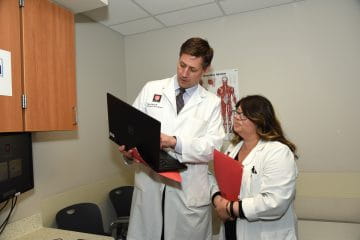The Orthopaedic Trauma Fellowship at Indiana University School of Medicine is a one-year program, accredited by the Accreditation Council for Graduate Medical Education (ACGME) and the Orthopaedic Trauma Association (OTA). Funding sources include the Center of Orthopaedic Trauma Advancement, the AO Trauma North America Long-Term Fellowship Program and OMeGA Medical Grants Association.
The fellowship offers trainees a dynamic experience that encompasses all aspects of orthopaedic trauma at Indiana’s most experienced Level I Trauma Center IU Health Methodist Hospital in Indianapolis. Fellows receive an unmatched level of engagement from IU School of Medicine faculty orthopaedic surgeons to enhance surgical technique and skill through individually tailored and focused training.

